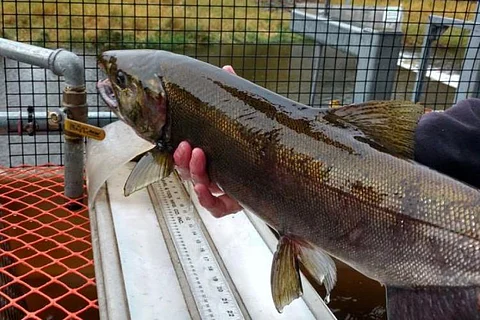

Coho salmon from the Lostine River.
Image credit: Nez Perce Tribe / NOAA.
The US Government has announced a major investment of over $105 million to support salmon recovery projects along the West Coast and in Alaska.
The funding, announced on August 1 by the US Department of Commerce and NOAA Fisheries, aims to enhance state and tribal programs dedicated to restoring salmon populations and their habitats, supporting the economies and cultural traditions of coastal communities.
The funding will be distributed through the Pacific Coastal Salmon Recovery Fund (PCSRF), and will be allocated to 14 new and ongoing projects in Alaska, California, Idaho, Oregon, and Washington, focusing on habitat restoration, stock enhancement, sustainable fisheries, and research and monitoring.
The investment will benefit 28 Endangered Species Act (ESA)-listed salmon and steelhead species, as well as other non-listed species important for tribal treaty fishing rights and native subsistence.
Nearly half of the funds are earmarked for tribal applicants, highlighting the administration’s commitment to supporting Indigenous communities and their traditional fishing practices.
“This $105 million investment, made possible thanks to the Biden-Harris Administration’s Investing in America agenda, will build on decades of salmon recovery work while helping Pacific Coast Tribes and Alaska Natives sustain their communities and cultural traditions in the face of climate change," said U.S. Secretary of Commerce Gina Raimondo.
“The PCSRF program has benefited fish populations and their habitats in so many ways," added Janet Coit, Assistant Administrator for NOAA Fisheries.
"The value of these investments goes far beyond recovering Pacific salmon and steelhead and their habitats, to also provide community and economic benefits, such as jobs and climate resilience.”
The funding will be distributed as follows, with values rounded to the nearest thousand, as listed on the NOAA website.
Alaska
The Alaska Department of Fish and Game’s Alaska Sustainable Salmon Fund will support projects to maintain healthy salmon populations and restore habitats. Projects funded include the protection of water quantity and quality, land conservation, fish passage improvements, removal of invasive species, instream restoration and monitoring of salmon populations. ($6,800,000)
The Arctic-Yukon-Kuskokwim Consortia will support population research and monitoring to better understand complex relationships between salmon and freshwater, nearshore and marine environments while improving the management and recovery of declining salmon populations. ($500,000)
The Chilkat Indian Village will monitor water quality and increase their tribal capacity to document current conditions in portions of the Chilkat watershed prior to future development that may impact salmon populations important for native subsistence. The Chilkat Indian Village is a new PCSRF recipient. ($716,700, new project)
California
The California Department of Fish and Wildlife’s Fisheries Restoration Grant Program will fund large-scale, process-based habitat restoration projects for salmon and steelhead throughout the state. These projects aim to improve the spawning success of adult salmon and steelhead, and increase the health and survival of all life stages of salmon and steelhead. ($18,100,000)
The Klamath River Inter-Tribal Fish and Water Commission, as a support organization to four federally recognized tribes in the Klamath Basin, will administer awards to its member tribes to conduct habitat restoration activities, monitoring and research. ($2,428,000)
Idaho
The Idaho Pacific Coastal Salmon Recovery Program administered by the Idaho Governor’s Office of Species Conservation will fund projects that are compatible with the Columbia Basin Collaborative sustainability goals, including enhancing the availability and quality of salmon habitats and improving management practices. ($9,500,000)
The Coeur d’Alene Tribe will conduct the final phase of a four-year study to collect baseline data that is necessary to inform the full-scale feasibility of salmon reintroductions upstream of Chief Joseph and Grand Coulee dams by studying the downstream movement and survival of juvenile Chinook salmon. ($700,000)
The Shoshone Bannock Tribes will participate in fishery forecasting and in-season management of tribal fisheries on Snake River spring/summer Chinook salmon, under their Cultural and Subsistence Fishery Monitoring and Management Program. ($41,000)
Oregon
The Oregon Watershed Enhancement Board will fund high-priority salmon recovery projects and support the Oregon Department of Fish and Wildlife’s salmon recovery programs that are integral to the Oregon Plan for Salmon and Watersheds. This award will also support the Department’s Klamath post-dam removal monitoring for two years. ($22,250,000)
The Columbia River Inter-Tribal Fish Commission, as a support organization to the four Columbia River Treaty Tribes, will administer awards to its member tribes based on high-priority needs for salmon to include all aspects of salmon recovery including planning and design, implementation, monitoring and research. ($6,862,000)
The Coquille Indian Tribe will restore the riparian buffer along the mainstem of the South Fork Coquille River to improve water quality for threatened Oregon Coast coho salmon. This project will demonstrate new and innovative nature-based restoration solutions to other agricultural landowners within the Coquille River basin. ($3,608,000, new project)
Washington
Washington's Salmon Recovery Funding Board, through the Washington State Recreation and Conservation Office, will continue work to recover ESA-listed salmon and support treaty fishing rights through habitat restoration and fishery monitoring efforts. ($26,000,000)
The Northwest Fisheries Indian Commission, as a support organization to 20 Puget Sound and Washington coastal Treaty Tribes, will administer awards to restore and protect habitats, conduct monitoring and enable projects that will help fulfill tribal treaty fishing rights for ESA-listed salmon and steelhead. ($7,693,000)
The Confederated Tribes of the Colville Reservation will implement the third year of studying salmon reintroduction upstream of Chief Joseph and Grand Coulee Dams in the Upper Columbia Basin. The project aims to support the restoration of native subsistence fishing in an area deprived of salmon for more than 80 years. ($747,000)
